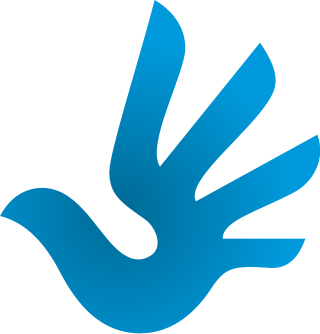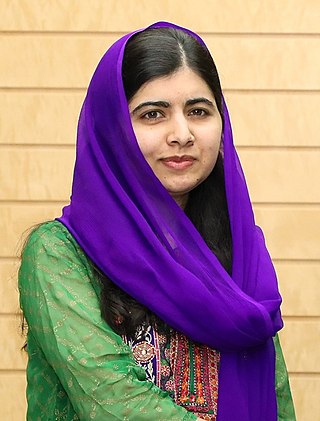Related Research Articles

The Nobel Prizes are five separate prizes awarded to those who, during the preceding year, have conferred the greatest benefit to humankind, as established by the 1895 will of Swedish chemist, engineer, and industrialist Alfred Nobel, in the year before he died. Prizes were first awarded in 1901 by the Nobel Foundation. Nobel's will indicated that the awards should be granted in the fields of Physics, Chemistry, Physiology or Medicine, Literature, and Peace. A sixth prize for Economic Sciences, endowed by Sweden's central bank, Sveriges Riksbank, and first presented in 1969, is also frequently included, as it is also administered by the Nobel Foundation. The Nobel Prizes are widely regarded as the most prestigious awards available in their respective fields.

The World Food Programme (WFP) is an international organization within the United Nations that provides food assistance worldwide. It is the world's largest humanitarian organization and the leading provider of school meals. Founded in 1961, WFP is headquartered in Rome and has offices in 80 countries. As of 2021, it supported over 128 million people across more than 120 countries and territories.

The Right Livelihood Award is an international award to "honour and support those offering practical and exemplary answers to the most urgent challenges facing us today." The prize was established in 1980 by German-Swedish philanthropist Jakob von Uexküll, and is presented annually in early December. An international jury, invited by the five regular Right Livelihood Award board members, decides the awards in such fields as environmental protection, human rights, sustainable development, health, education, and peace. The prize money is shared among the winners, usually numbering four, and is €200,000. Very often one of the four laureates receives an honorary award, which means that the other three share the prize money.

Mairead Maguire, also known as Mairead Corrigan Maguire and formerly as Mairéad Corrigan, is a peace activist from Northern Ireland. She co-founded, with Betty Williams and Ciaran McKeown, the Women for Peace, which later became the Community for Peace People, an organization dedicated to encouraging a peaceful resolution of the Troubles in Northern Ireland. Maguire and Williams were awarded the 1976 Nobel Peace Prize.

Shirin Ebadi is an Iranian Nobel laureate, lawyer, writer, teacher and a former judge and founder of the Defenders of Human Rights Center in Iran. In 2003, Ebadi was awarded the Nobel Peace Prize for her pioneering efforts for democracy and women's, children's, and refugee rights. She was the first Muslim woman and the first Iranian to receive the award.

Carlo Rovelli is an Italian theoretical physicist and writer who has worked in Italy, the United States, France, and Canada. He is currently Emeritus Professor at the Centre de Physique Theorique of Marseille in France, a Distinguished Visiting Research Chair at the Perimeter Institute, core member of the Rotman Institute of Philosophy of Western University in Canada, and Fractal Faculty of the Santa Fe Institute in The United States.

Wangarĩ Muta Maathai was a Kenyan social, environmental, and political activist who founded the Green Belt Movement, an environmental non-governmental organization focused on the planting of trees, environmental conservation, and women's rights. In 2004 she became the first African woman to win the Nobel Peace Prize.
Peace dividend was a political slogan popularized by US President George H. W. Bush and UK Prime Minister Margaret Thatcher in the light of the 1988–1991 dissolution of the Soviet Union, that described the economic benefit of a decrease in defense spending. The term was frequently used at the end of the Cold War, when many Western nations significantly cut military spending such as Britain's 1990 Options for Change defence review. It is now used primarily in discussions relating to the guns versus butter theory.

The International Peace Bureau, founded in 1891, is one of the world's oldest international peace federations. The organisation was awarded the Nobel Peace Prize in 1910 for acting "as a link between the peace societies of the various countries". In 1913, Henri La Fontaine was also awarded the Prize "[For his work as] head of the International Peace Bureau". As of 2012, eleven other Nobel Peace Prize laureates have been members of the IPB.

The International Children's Peace Prize is awarded annually to a child who has made a significant contribution to advocating children's rights and improving the situation of vulnerable children such as orphans, child labourers and children with HIV/AIDS.
The Economists' statement opposing the Bush tax cuts was a statement signed by roughly 450 economists, including ten of the twenty-four American Nobel Prize laureates alive at the time, in February 2003 who urged the U.S. President George W. Bush not to enact the 2003 tax cuts; seeking and sought to gather public support for the position. The statement was printed as a full-page ad in The New York Times and released to the public through the Economic Policy Institute. According to the statement, the 450 plus economists who signed the statement believe that the 2003 Bush tax cuts will increase inequality and the budget deficit, decreasing the ability of the U.S. government to fund essential services, while failing to produce economic growth.

Tawakkol Abdel-Salam Khalid Karman is a Yemeni journalist, politician, and human rights activist. She leads the group "Women Journalists Without Chains," which she co-founded in 2005. She became the international public face of the 2011 Yemeni uprising that was part of the Arab Spring uprisings. In 2011, she was reportedly called the "Iron Woman" and "Mother of the Revolution" by some Yemenis. She is a co-recipient of the 2011 Nobel Peace Prize, becoming the first Yemeni, the first Arab woman, and the second Muslim woman to win a Nobel Prize.

The Human Rights Logo has its origin in the international "Logo for Human Rights" initiative, which was started in 2010. Its goal was to create an internationally recognized logo to support the global human rights movement. The winning logo was created by Predrag Stakić from Serbia.

Malala Yousafzai is a Pakistani female education activist and the 2014 Nobel Peace Prize laureate at the age of 17. She is the youngest Nobel Prize laureate in history, the second Pakistani and the only Pashtun to receive a Nobel Prize. Yousafzai is a human rights advocate for the education of women and children in her native homeland, Swat, where the Pakistani Taliban had at times banned girls from attending school. Her advocacy has grown into an international movement, and according to former Prime Minister Shahid Khaqan Abbasi, she has become Pakistan's "most prominent citizen."
The Nobel Women's Initiative is an international advocacy organisation based in Ottawa, Canada. It was created in 2006 by six female winners of the Nobel Peace Prize to support women's groups around the world in campaigning for justice, peace and equality. The six founders are Shirin Ebadi, Wangari Maathai, Rigoberta Menchú, Jody Williams, Mairead Maguire, and Betty Williams. The only other living female Nobel Peace Prize winner, Aung San Suu Kyi, was under house arrest at the time of the initiative's formation. She became an honorary member on her release in 2010. The initiative's first conference, in 2007, focused on women, conflict and security in the Middle East.

Nadia Murad Basee Taha is an Iraqi-born Yazidi human rights activist based in Germany. In 2014, as part of the Yazidi genocide by the Islamic State, she was abducted from her hometown of Kocho in Iraq and much of her community was massacred. After losing most of her family, Murad was held as an Islamic State sex slave for three months, alongside thousands of other Yazidi women and girls.
References
- ↑ "Global Peace Dividend" . Retrieved 2024-08-28.
- ↑ Sabbagh, Dan (2021-12-14). "'Colossal waste': Nobel laureates call for 2% cut to military spending worldwide". The Guardian. Retrieved 2022-01-25.
- ↑ Vallentin, Claudia (2021-12-14). "Nobelpreisträger fordern ein Ende des Wettrüstens". Die Zeit. Retrieved 2022-01-25.
- ↑ Ro, Christine (2022-01-19). "Nobel Prize Winners Are Urging Every Country To Cut Military Spending By 2%". Forbes. Retrieved 2022-01-25.
- ↑ "Global Peace Dividend Appeal Signatories" . Retrieved 20 January 2022.
- ↑ Smerlak, Matteo; Rovelli, Carlo (18 January 2022). "Put defence money into planetary emergencies, urge Nobel winners". Nature. 601 (7893): 318. doi:10.1038/d41586-022-00096-5. PMID 35042994. S2CID 246060014.
- ↑ Smerlak, Matteo; Rovelli, Carlo (2022-01-18). "Mille milliards d'euros en cinq ans pour lutter contre les urgences planétaires". Libération. Retrieved 2022-01-25.